Are you a tequila connoisseur looking to embark on an unforgettable journey through Mexico’s tequila distilleries? Or perhaps you’re curious about the best tequila distilleries to visit on your next vacation? Either way, I’ve got you covered. In this article, we’ll dive deep into the world of tequila and explore the top distilleries in Mexico that are sure to delight your senses and leave you with a newfound appreciation for this beloved spirit. From the historic Cuervo La Rojena to the artisanal Casa Salles, we’ll take a virtual tour of the most renowned tequila destinations in Mexico. So, grab a glass and join me on this tequila-filled adventure!
Key Takeaways:
- Discover the best tequila distilleries in Mexico
- Learn about the rich history and cultural significance of tequila
- Uncover the secrets behind traditional tequila-making methods
- Explore the unique flavors and profiles of different tequila brands
- Find out how Mexico’s tequila distillery regulations ensure quality and authenticity
Contents
- 1 Cuervo La Rojena
- 2 Casa Salles
- 3 Casa Sauza Mosaic
- 4 Fortaleza Distillery
- 5 Don Fulano
- 6 La Capilla bar
- 7 Mexico’s Tequila Distillery Regulations
- 8 An Introduction to Tequila
- 9 How Is Tequila Made in Mexico?
- 10 What Sets Artisanal Tequila Apart
- 11 Where to Find Tequila Distilleries in Mexico
- 12 FAQ
- 13 Source Links
Cuervo La Rojena
Cuervo La Rojena stands as a testament to the rich history of tequila-making in Mexico. As one of the oldest distilleries, it was founded in 1758 and is widely recognized as the birthplace of the Jose Cuervo brand, the oldest tequila brand in all of Latin America.
Situated in the charming town of Tequila, Cuervo La Rojena offers a captivating journey into the world of tequila through its distillery tours, available in both English and Spanish. Visitors have the opportunity to immerse themselves in the fascinating story of tequila, delve into the distillery’s operations, and indulge in tastings of their exquisite silver, reposado, and añejo tequilas.
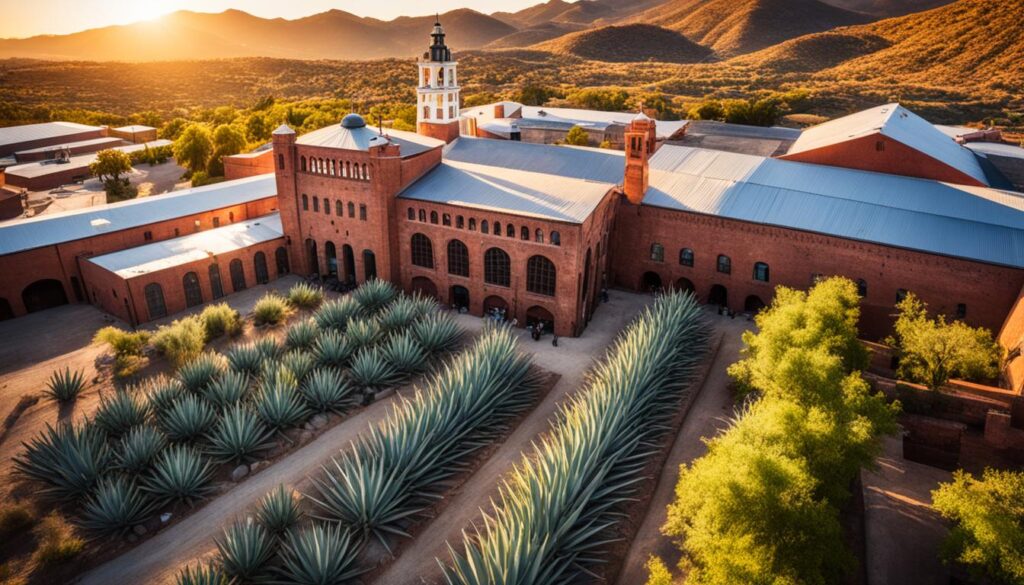
I was truly captivated by the rich history and authenticity of Cuervo La Rojena. The distillery tour gave me a deep appreciation for the meticulous craftsmanship and dedication that goes into every bottle of Jose Cuervo tequila.
Whether you’re a tequila aficionado or simply curious about the heritage of this renowned spirit, a visit to Cuervo La Rojena should undoubtedly be on your itinerary.
Join me as we uncover the hidden gems of the tequila industry and embark on a tequila adventure that will leave you with a newfound appreciation for the artistry behind this iconic Mexican drink.
Casa Salles
When it comes to artisanal tequila, one distillery that stands out is Casa Salles, also known as El Tequileño. Situated in the heart of Tequila, this boutique distillery has gained recognition for its commitment to traditional tequila-making methods and the use of 100% agave.
El Tequileño’s dedication to preserving the authenticity of tequila extends beyond traditional practices. The distillery offers a unique tequila formula that diverges from the standard 100% agave requirement. Instead, they use piloncillo, a raw form of pure cane sugar, in their tequila production process, known as “mixtos.”
This tequila formula has historical significance, dating back to the early days of tequila production. It adds a distinct flavor profile to El Tequileño’s range of tequilas, making them stand out among other artisanal brands. The tequilas produced at Casa Salles are renowned for their smoothness and complexity, capturing the essence of authentic Mexican craftsmanship.
At Casa Salles, we believe in honoring the traditions of tequila-making while pushing the boundaries of flavor experimentation. Our tequilas not only pay homage to the rich history of the spirit but also offer a unique experience for tequila enthusiasts seeking something truly exceptional. – Casa Salles
Tequila Tasting Notes from Casa Salles
- Tequila: Añejo
- Color: Deep amber
- Notes: Rich caramel, vanilla, and oak with a hint of piloncillo sweetness
- Pairing: Dark chocolate
- Tequila: Reposado
- Color: Golden
- Notes: Smooth agave, toasted oak, and a touch of piloncillo sweetness
- Pairing: Grilled pineapple
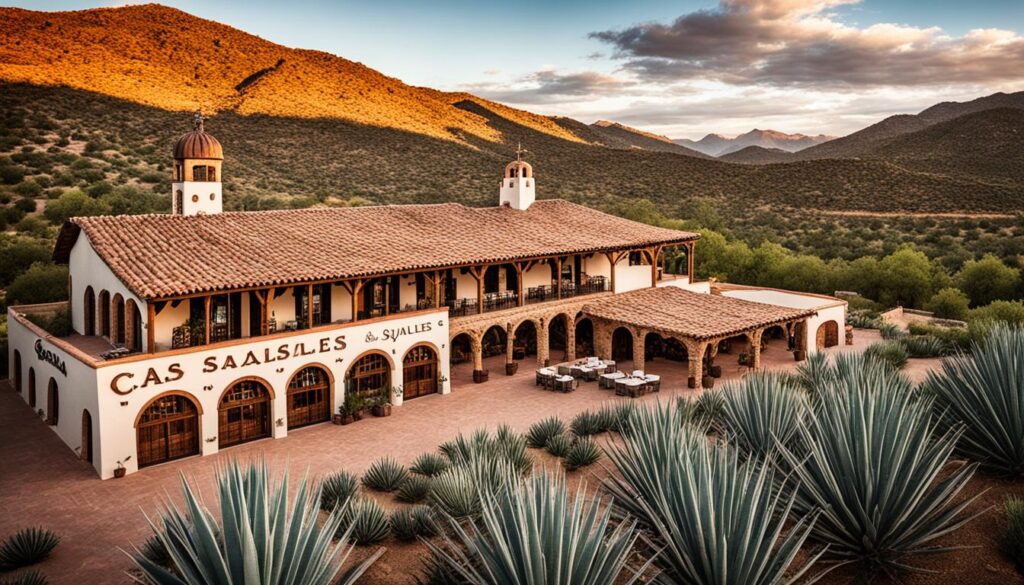
| Tequila | Category | ABV |
|---|---|---|
| Blanco | Unaged | 40% |
| Reposado | Aged | 40% |
| Añejo | Aged | 40% |
| Extra Añejo | Aged | 40% |
Casa Sauza Mosaic
I am excited to introduce Casa Sauza, one of the most prominent players in the tequila industry. With a rich history dating back centuries, Casa Sauza is known for its prestigious standing as one of the oldest and largest distilleries.
✨Fun Fact: Casa Sauza was the first distillery to export tequila to the United States, playing a pivotal role in popularizing this iconic Mexican spirit.✨
If you’re planning a visit, don’t miss the opportunity to explore the Casa Sauza Mosaic distillery—a true tequila enthusiast’s dream come true. This captivating tour offers a unique experience that goes beyond just tasting tequila.
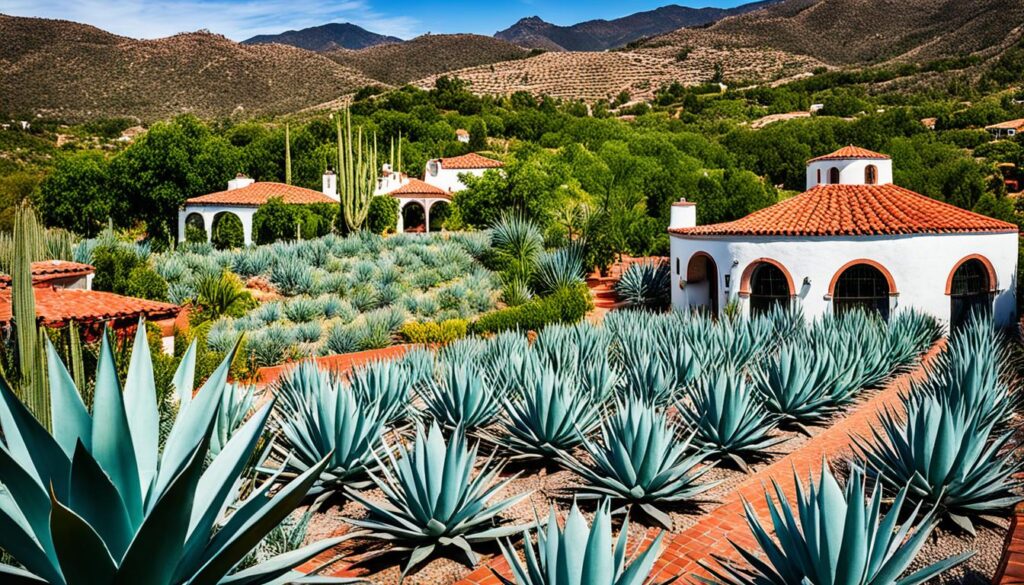
During the tour, you’ll have the chance to stroll through an enchanting agave botanical garden, immersing yourself in the natural beauty of these magnificent plants. As you walk among them, you’ll learn about their cultivation and cultivation process, gaining a deeper appreciation for the intricate artistry behind tequila production.
In addition to marveling at the stunning agave plants, visitors to the Casa Sauza Mosaic distillery can even participate in a unique hands-on activity—planting their very own agave. This interactive experience allows you to leave a lasting mark on the distillery’s beautiful landscape, creating a personal connection to the world of tequila.
After exploring the agave botanical garden, the tour continues with a special focus on mixology. Learn how to craft the perfect Cantarita, a delightful tequila-based mixed drink that is sure to impress your friends at your next gathering. Discover the art of mixing flavors and the importance of balance as you create your own Cantarita masterpiece.
“The Casa Sauza Mosaic distillery tour is a true feast for the senses—a journey through tequila’s rich history, the beauty of nature, and the art of mixology.”
Whether you’re a tequila aficionado or simply looking to immerse yourself in Mexico’s vibrant culture, a visit to Casa Sauza is a must. Embark on a remarkable journey as you explore the fascinating world of tequila production, surrounded by the breathtaking beauty of the agave botanical garden.
Come prepared to savor the moments, indulge in unparalleled flavors, and create memories that will last a lifetime.
Fortaleza Distillery
The Fortaleza distillery, located in Tequila, is a hidden gem in the world of tequila-making. While smaller in scale compared to other distilleries, Fortaleza holds immense significance because it continues the legacy of the renowned Sauza family in the industry.
When visiting the Fortaleza distillery, prepare for an experience that requires advance planning but is well worth the effort. As you step onto the distillery grounds, you’ll immediately be greeted by breathtaking views of sprawling agave fields and the charming city of Tequila.
One of the highlights of the tour is a visit to a lookout point that offers panoramic views of the agave fields and Tequila itself. Take in the picturesque landscapes and capture memorable photos of this tequila-producing region.
Fortaleza also boasts a private lake on the distillery grounds, allowing visitors to immerse themselves in nature while enjoying the tranquil atmosphere. This serene spot is perfect for connectivity and reflection, providing a peaceful escape from the bustling city.
After a day of exploration, indulge in a delightful treat that truly exemplifies the flavors of Mexico. As part of the tour, visitors have the option to savor homemade fish tacos for lunch, prepared with fresh ingredients and traditional recipes. This culinary experience adds a scrumptious touch to your tequila adventure.
If you’re seeking an intimate and authentic tequila experience, Fortaleza Distillery delivers the perfect blend of heritage, natural beauty, and gastronomic delights.
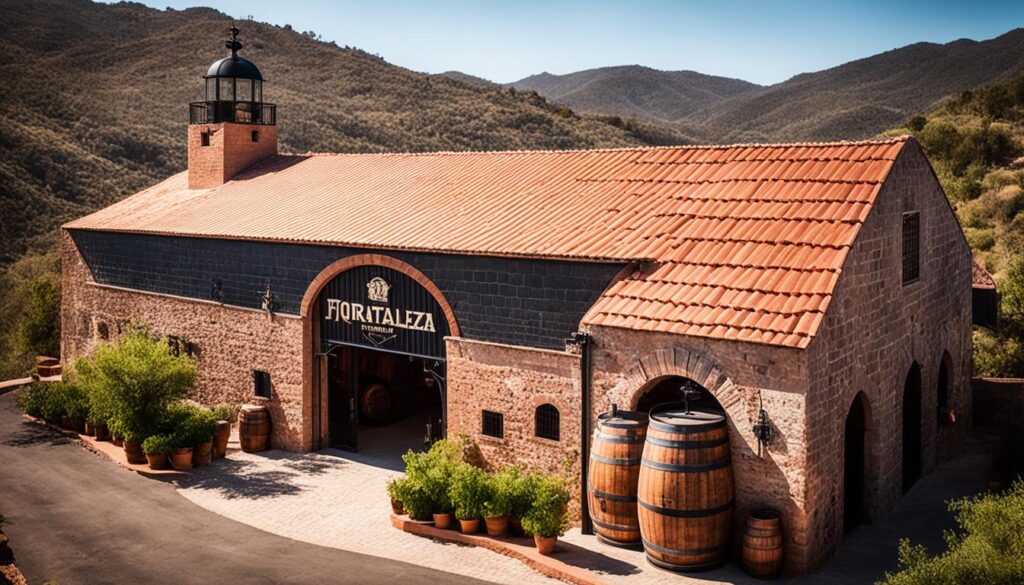
| Highlights | Location | Tour Information |
|---|---|---|
| Breathtaking views of agave fields and Tequila | Tequila, Mexico | Tours require advanced planning and reservations |
| Private lake on distillery grounds | Experience homemade fish tacos for lunch |
Don Fulano
Don Fulano is a renowned manufacturing facility located in the picturesque town of Tequila, Mexico. As a producer of several tequila brands, Don Fulano is dedicated to crafting exceptional tequilas that capture the essence of the region.
One of the standout offerings from Don Fulano is their Don Fulano Tequila Imperial Extra Añejo. This exquisite tequila has garnered awards for its superior quality and craftsmanship. With its rich and complex flavor profile, it is truly a testament to the distillery’s commitment to excellence.
What sets Don Fulano apart from other tequila brands is its dedication to producing additive-free tequilas. This commitment ensures that every bottle of Don Fulano tequila is made solely from the finest ingredients, allowing the natural flavors of the agave to shine through.
“At Don Fulano, we believe in letting the purity of the agave take center stage. Our additive-free approach allows us to create tequilas that are true to the spirit and heritage of this iconic Mexican beverage.”
While regular tours are not available to the public, Don Fulano offers technical visits that can be arranged by appointment. These visits provide a unique opportunity to delve deeper into the tequila-making process and gain insights into the points of differentiation between different tequila brands.
Explore the exceptional world of Don Fulano and discover the true artistry behind their additive-free tequilas.
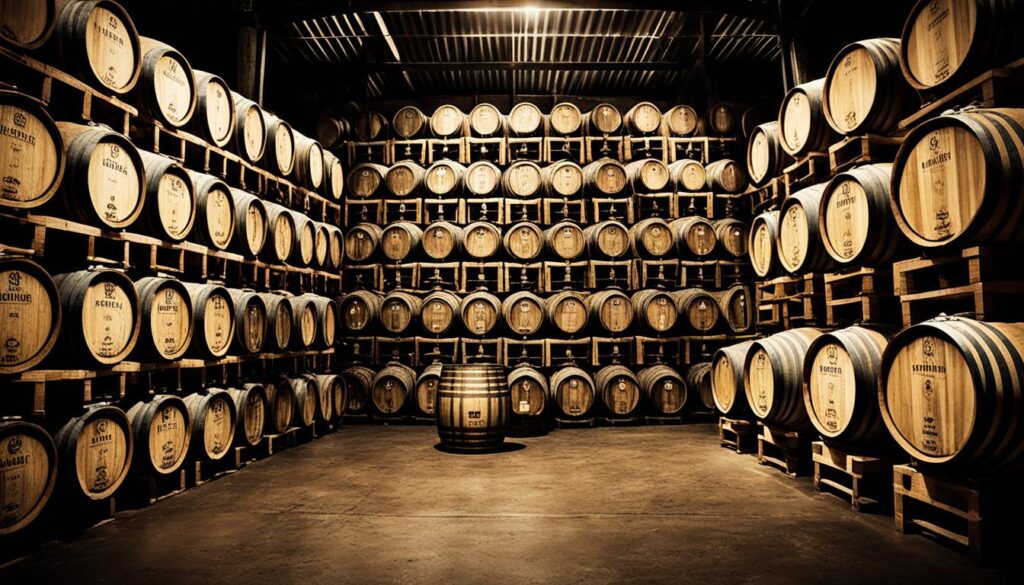
| Tequila Brand | Specialty |
|---|---|
| Don Fulano Tequila Imperial Extra Añejo | Additive-free tequila with a rich and complex flavor profile |
| Other Tequila Brands | Various tequila expressions that showcase the distillery’s dedication to quality and craftsmanship |
La Capilla bar
When it comes to exploring the tequila scene in Tequila, a visit to La Capilla is a must. While not a distillery, this iconic bar holds a special place in the heart of the town. La Capilla is known as the oldest bar in Tequila and is steeped in history and tradition.
Established in the early 1940s by Don Javier Delgado Corona, La Capilla exudes a lowbrow charm that is irresistibly inviting. Despite its humble appearance, the bar has gained international recognition and has been listed among the World’s 50 Best Bars.
So, what makes La Capilla truly remarkable? It is the birthplace of a legendary tequila cocktail known as the Batanga. The Batanga is a simple yet delightful mix of tequila, lime juice, and Coca-Cola. The unique twist? The drink is stirred with a knife that is used to cut fresh limes for garnish, adding a touch of flair to the preparation process.
Visitors to La Capilla have the opportunity to witness the making of the Batanga firsthand. As the bartender skillfully stirs the cocktail with the lime-cutting knife, the flavors meld together, culminating in a refreshingly tangy and satisfying beverage.
The experience of being in La Capilla is like stepping back in time, immersing oneself in the rich history and vibrant energy of Tequila. Whether you’re a tequila aficionado or simply curious to explore the local drinking culture, La Capilla is a place that shouldn’t be missed.
Mexico’s Tequila Distillery Regulations
The production and labeling of tequila in Mexico are governed by the strict regulations set by the Tequila Regulatory Council (CRT). These regulations ensure the authenticity and quality of tequila, making it a cherished spirit worldwide.
Under the supervision of the CRT, tequila distilleries must adhere to specific guidelines throughout the tequila production process, from agave growing to the final bottling. This ensures that only authorized distilleries can produce and sell tequila, protecting consumers from counterfeit products.
One of the key aspects regulated by the CRT is the cultivation of agave, the plant used to make tequila. According to the regulations, only blue agave, specifically the Weber variety, can be used to produce tequila. This helps maintain the distinct flavor and character of authentic tequila.
The CRT also oversees the process of making tequila. Distilleries must follow the approved production methods, which include the cooking of agave hearts (piñas), fermentation, and distillation. Additionally, the CRT places restrictions on the use of additives and preservatives, ensuring that tequila remains pure and unadulterated.
Through these regulations, the CRT plays a crucial role in upholding the integrity of tequila production in Mexico. By guaranteeing the quality and authenticity of tequila, the CRT allows consumers to enjoy the true essence and flavors of this beloved spirit.
An Introduction to Tequila
Tequila, a beloved spirit known for its distinct flavor and rich cultural heritage, traces its origin back to the town of Tequila in Mexico. The town’s name itself became synonymous with the spirit that is derived from the cultivation and fermentation of the agave plant. Let’s explore the fascinating history and the traditional tequila-making process.
Tequila’s roots can be traced back to the 16th century when the Spanish arrived in what is now modern-day Mexico. They established the town of Santiago de Tequila and brought with them the knowledge of distillation, laying the foundation for the birth of tequila.
One of the key ingredients in tequila production is agave, a succulent plant native to Mexico. Agave cultivation plays a vital role in the tequila-making process. These spiky plants, often referred to as “blue agave,” are harvested and carefully selected to ensure the highest quality tequila.
The process of making tequila has evolved over the years, but the core principles have remained the same. To make tequila, the heart of the agave plant, known as the piña, is harvested and cooked using various methods. From there, the cooked agaves are crushed to extract their juices, which are then fermented and distilled to transform them into tequila.
“Tequila, the spirit of Mexico, is born from the agave plant and crafted with centuries-old techniques, passed down through generations.”
This traditional tequila-making process has enabled tequila producers to create an array of tequilas, each with its own unique flavor profile and characteristics. From the vibrant and earthy notes of blanco tequila to the smooth and complex profiles of reposado and añejo tequilas, there is a tequila to suit every palate.
The Making of Tequila: A Time-Honored Craft
The tequila-making process is a labor-intensive craft that requires skill and precision. Here is an overview of the tequila production process:
- Agave Harvesting: Skilled workers known as jimadores carefully harvest mature agave plants, selecting the piñas that are ready for tequila production.
- Agave Cooking Methods: The piñas are cooked to convert the starches into fermentable sugars. This can be done using traditional pit ovens or modern steam ovens, each method imparting its own unique flavors.
- Fermentation: The cooked agave juice is fermented, allowing natural or lab-supplied yeast to convert the sugars into alcohol. This process is crucial in shaping the flavor and character of the tequila.
- Distillation: The fermented juice, known as the must, is distilled to separate the alcohol from the rest of the liquid. Distillation helps refine the tequila and achieve the desired alcohol content.
- Tequila Aging: Some tequilas undergo an aging process in oak barrels, developing additional flavors and complexities over time. This step is common for reposado and añejo tequilas, while blanco tequilas are typically bottled immediately after distillation.
The dedication and artistry of tequila producers shine through in each step of the tequila-making process, resulting in a beloved spirit that has captivated the world.
| Tequila Types | Appearance | Flavor Profiles | Serving Suggestions |
|---|---|---|---|
| Blanco | Clear | Agave-forward, vibrant, herbal | Enjoy neat, in margaritas |
| Reposado | Light amber | Smooth, vanilla, oak | Enjoy neat, in cocktails |
| Añejo | Deep amber | Complex, caramel, spice | Enjoy neat, on the rocks |
Whether enjoyed straight, mixed into cocktails, or savored in a shot with lime and salt, tequila continues to captivate and delight connoisseurs around the world. Its time-honored traditions, coupled with the passion of the tequila producers, make it a spirit that truly embodies the spirit of Mexico.
How Is Tequila Made in Mexico?
The production process of tequila involves several key steps, each contributing to the unique flavors and characteristics of this iconic Mexican spirit.
Agave Harvesting
The first step in tequila production is the harvesting of agave plants, which are typically carried out by skilled workers known as jimadores. They carefully select mature agave plants and remove the leaves to expose the heart, known as the piña.
Agave Cooking Methods
After harvesting, the agave piñas are cooked to convert the starches into fermentable sugars. There are various cooking methods employed in tequila production. Some distilleries use steam ovens to cook the piñas, while others opt for traditional pit ovens, where the piñas are slow-roasted for an extended period. This cooking process adds complexity and depth to the flavor profile of the tequila.
Fermentation
Once cooked, the agave piñas are crushed or shredded to extract the sweet nectar. This juice, known as agave must, is then fermented. In some distilleries, natural yeast present in the environment is used for fermentation, allowing for unique flavors to develop. Others may utilize laboratory-supplied yeast to control the fermentation process more precisely. During fermentation, the sugars in the agave must are converted into alcohol, resulting in a mildly alcoholic liquid known as the wash.
Distillation
After fermentation, the wash undergoes distillation. Distillation is the process of separating alcohol from the agave juice. This is typically done in copper stills, which help to refine and concentrate the flavors. The distillation process is carried out in two stages: the first distillation separates the alcohol from the fermented wash, and the second distillation further refines the tequila, enhancing its aromatic and flavor characteristics.
Tequila Aging
Not all tequilas undergo aging, but for those that do, it is an essential step in the production process. Aged tequilas are typically aged in oak barrels for varying periods. The aging process imparts additional flavors and aromas to the tequila, adding complexity and depth. The length of aging determines the specific classification of the tequila, such as blanco (unaged), reposado (aged for a minimum of two months), añejo (aged for a minimum of one year), or extra añejo (aged for a minimum of three years).
By carefully following these steps, tequila distilleries in Mexico create the beloved spirit enjoyed by people around the world. The combination of agave harvesting, cooking methods, fermentation, distillation, and aging ensures the production of tequilas with a wide range of flavors and styles.
What Sets Artisanal Tequila Apart
Artisanal tequila distilleries in Mexico differentiate themselves from mass-produced tequilas through their focus on quality and traditional production methods. These distilleries avoid the use of additives and aim to bring out the true flavor of agave. They take pride in their craftsmanship and attention to detail at every stage of the production process. By maintaining an artisanal process, they create tequilas with unique flavor profiles that truly reflect the essence of agave.
Traditional Methods and Quality
Artisanal tequila distilleries uphold time-honored techniques passed down through generations. Unlike mass-produced tequilas, which prioritize efficiency and high production volumes, artisanal producers put quality above everything else. They carefully select the finest agave plants and oversee each step of the tequila-making process with meticulous care. From harvesting and cooking the agave to fermentation and distillation, every detail contributes to the creation of a superior tequila.
No Additives or Shortcuts
Additive-free tequila is a hallmark of artisanal distilleries. These producers understand the importance of allowing the natural flavors of agave to shine through without masking them with artificial additives. They embrace a pure and authentic approach, ensuring that every sip of their tequila reflects the true essence of the agave plant. By avoiding shortcuts and additives, artisanal tequila producers preserve the integrity and authenticity of their products.
“Our commitment to crafting additive-free tequila allows us to showcase the unique flavor profiles that arise from the agave plant. We believe in preserving the traditions and heritage of tequila production, ensuring an exceptional tasting experience for tequila enthusiasts worldwide.” – Arturo López, Master Tequilero at an artisanal distillery
Unique Flavor Profiles
Artisanal tequila distilleries are renowned for producing tequilas with distinctive flavor profiles. Each distillery has its own methods and techniques that contribute to the subtle nuances in taste. The attention to detail and hands-on approach of the artisans result in tequilas that exhibit a complexity of flavors, ranging from earthy and spicy to floral and fruity notes. Every bottle of artisanal tequila offers a unique sensory experience, inviting enthusiasts to explore the diverse and rich flavors derived from agave.
| Characteristic | Mass-Produced Tequila | Artisanal Tequila |
|---|---|---|
| Taste | Standardized and predictable | Unique flavor profiles that showcase the essence of agave |
| Production Method | Efficient mass production | Traditional, hands-on craftsmanship |
| Quality Control | Automation and standardization | Meticulous attention to detail at every step |
| Additives | Artificial additives may be used | No additives, pure and authentic |
| Market Presence | Widely available and commercial | Niche, sought-after by tequila connoisseurs |
Where to Find Tequila Distilleries in Mexico
The state of Jalisco in Mexico is renowned as the heart of the tequila industry, and it’s here where you’ll find the Tequila Valley, a significant tequila-producing region. Situated around the majestic Tequila Volcano, the region is easily accessible from the vibrant city of Guadalajara.
Aside from the Tequila Valley, there are also tequila distilleries in the Los Altos region, with its hub in the picturesque town of Arandas. These distilleries offer a unique perspective on tequila production, showcasing their own distinct methods and flavors.
For those looking to embark on a tequila adventure, Guadalajara serves as an ideal starting point. From here, you can embark on the famous Tequila Trail, a journey that takes you through the stunning landscapes of Jalisco’s municipalities, where you can visit various tequila distilleries, learn about the tequila-making process, and indulge in delightful tastings.